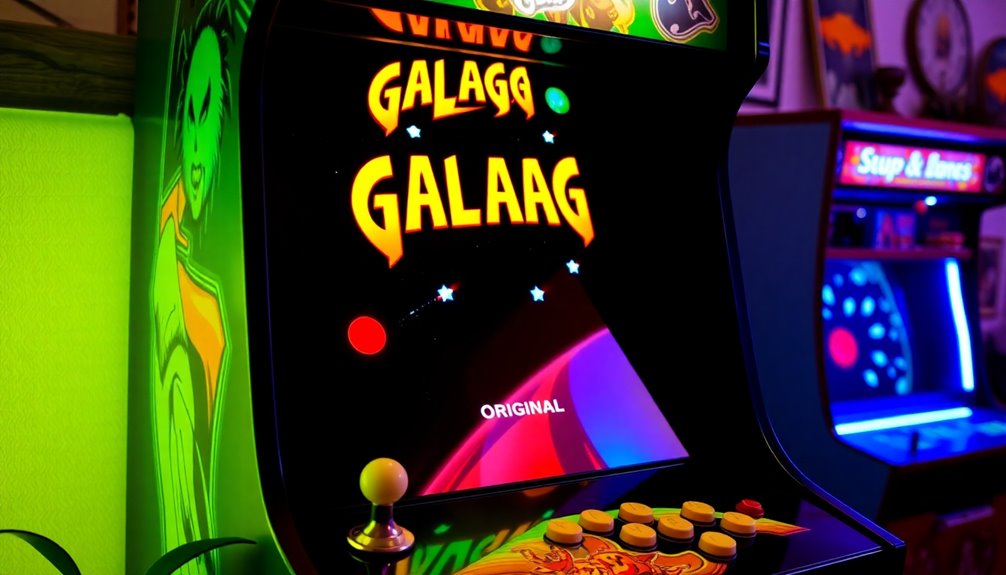Yes, arcade games are a form of video game that emphasize fast-paced gameplay to challenge your reflexes, often utilizing simple controls like joysticks and a few buttons. Emerging in the 1980s, these coin-operated machines fostered competition through high score displays and brief play sessions. While some arcade games require skill, others incorporate elements of luck. You can discover iconic titles that shaped gaming culture, like Donkey Kong and Pac-Man. If you’re interested in exploring the various types of arcade games and their influence on gaming culture, there is plenty more to learn.
Key Takeaways
- Arcade games are a category of video games, typically designed for quick play sessions in public spaces.
- They focus on fast-paced gameplay and often feature competition through high score displays.
- Video arcade games do not involve ticket rewards, unlike redemption or merchandiser games.
- Classic arcade games have nostalgic appeal, contributing to their classification as video games.
- The evolution of arcade games includes advancements in technology, showcasing them as a significant part of video gaming history.
Definition of Arcade Games
Arcade games are a distinct category of video games that emerged in the 1980s as coin-operated machines designed for public entertainment. Unlike home console games, arcade games are typically found in dedicated arcade spaces, featuring bulky arcade cabinets that invite quick play sessions.
These machines emphasize fast-paced gameplay, testing your reflexes and precision with simple control schemes that often limit interactions to just a few buttons and a joystick. Many arcade games have also influenced the design of modern best arcade machines with integrated technology, appealing to both casual and serious gamers.
You'll find that arcade games usually consist of short levels, making it easy to jump in and out of gameplay. This design encourages competition, as players aim to achieve high scores, often displayed prominently on the screen.
Games like Donkey Kong and Street Fighter became cultural phenomena, later ported to home consoles, but their essence remains rooted in the arcade experience.
The thrill of inserting a coin into a machine and battling for the top score is a defining characteristic of arcade games. With their focus on quick, engaging sessions rather than deep narratives, these coin-operated machines provide a unique form of entertainment that stands apart from the more immersive experiences offered by home consoles.
Types of Arcade Games

You'll often find arcade games divided into three primary types: Video games, Redemption games, and Merchandiser games. Each type offers a unique gaming experience that shapes your enjoyment in the arcade industry, much like how celebrities enjoy various avenues of entertainment, from celebrity lifestyle insights to exciting events.
- Video games focus on pure fun and competition, with no ticket rewards or merchandise involved.
- Redemption games like Skee-Ball and Stop the Wheel offer ticket rewards based on your performance, letting you accumulate points to exchange for prizes.
- Merchandiser games, such as claw machines, dispense prizes directly, adding an exciting twist to your gaming experience.
- Classic arcade games often fall under these categories, bringing nostalgia and fun to players of all ages.
Understanding these types can help you choose which games to play based on what you enjoy most.
Whether you're chasing the thrill of a high score, collecting tickets for prizes, or trying your luck at a claw machine, each type contributes to the vibrant atmosphere of the arcade.
Skill-Based vs. Chance Games

When diving into the world of arcade games, you'll quickly notice two main categories: skill-based and chance games.
Skill-based games, like pinball machines and Skee-Ball, require your ability and strategy to achieve high scores. Your performance directly impacts the outcomes, rewarding practice and skill development. These games engage you more actively, making every play feel rewarding.
On the other hand, chance games, such as slot machines and pachinko, hinge on luck. Here, your input has minimal effect on the results, as outcomes are determined by random mechanics. While they can be thrilling, they offer a different experience, focusing less on player skill and more on the element of surprise.
Redemption games blend both worlds, often rewarding you with tickets or prizes based on your performance, while still incorporating a degree of luck. This mix can be enticing and adds another layer to arcade gaming.
It's essential to understand that regulatory classifications often depend on this distinction between skill-based and chance games, affecting the legality and availability of various arcade games in different areas.
Historical Evolution of Arcade Games

Evolving from simple coin-operated machines in the 19th century to sophisticated video games, the history of arcade games showcases a remarkable journey of innovation. The first arcade games emerged with titles like "Computer Space" in 1971 and "Pong" in 1972, marking the dawn of commercial arcade video gaming.
As gaming technology advanced, similar innovations were seen in best rated pinball machines of 2024, illustrating the ongoing evolution of arcade entertainment.
As you explore the Golden Age of arcade games, you'll find it defined by key milestones that shaped your gaming experience:
- 1978: "Space Invaders" launched a craze, pulling players into arcades.
- 1980: "Pac-Man" became a cultural icon, enchanting audiences everywhere.
- 1981: "Donkey Kong" introduced narrative depth to gameplay.
- 1990s: Technological advancements brought 3D graphics with titles like "Virtua Racing," enhancing visual appeal.
Despite facing declines after the 1983 video game crash due to market saturation and the rise of home consoles, the arcade industry rebounded.
This era showcased the power of innovation in gameplay, adapting to modern technologies like virtual reality and multiplayer options. The evolution of arcade games reflects your passion for immersive experiences and highlights the journey that continues to shape gaming today.
Cultural Impact of Arcade Games

Arcade games have considerably shaped video game culture, serving as vibrant social hubs where players gathered to compete and connect. During the golden age of the 1980s, iconic titles like Pac-Man and Space Invaders not only influenced game design but also permeated popular culture, leading to merchandise and even music. This cultural impact fosters a sense of nostalgia, as you remember the lively atmosphere of arcades filled with laughter and competition.
Additionally, the incorporation of unique party options into celebrations has drawn inspiration from the engaging nature of arcade gaming, enhancing social interactions at events.
The community created around arcade games laid the groundwork for competitive gaming and modern e-sports. Titles like Street Fighter II sparked scenes that still thrive today, showcasing skill and strategy.
As traditional arcades declined in the late 1990s and early 2000s, cultural trends shifted toward Family Entertainment Centers, blending dining and gaming to cater to changing consumer preferences.
Today, the resurgence of interest in retro gaming and barcades reflects our longing for those shared experiences. Arcade games are more than just entertainment; they've become a significant part of our cultural fabric, influencing how we connect, compete, and celebrate video game culture.
Frequently Asked Questions
Are Arcade Games Considered Video Games?
Yes, arcade games are considered video games. You interact with them through screens and controls, just like other video games. Their fast-paced gameplay and iconic titles have shaped the gaming landscape since their inception. Arcade games often rely on traditional joystick and button controls, providing a more physically immersive gaming experience. Their appeal also extends to the social aspect, as players can compete against each other in person. Additionally, the flashing lights and sound effects contribute to the overall excitement of playing arcade games. These elements are all integral to how arcade games operate and why they continue to be popular among gamers of all ages.
What Kind of Game Is Arcade?
Imagine the thrill of dropping a quarter into a machine, your heart racing. Arcade games are fast-paced, skill-focused experiences designed for quick play sessions, often featuring simple controls that keep you coming back for more excitement.
What Are Considered as Video Games?
Video games are electronic games you interact with via a user interface, generating visual feedback. They include various formats like home consoles, mobile games, and arcade machines, all defined by their engaging gameplay and objectives.
Why Are Video Games Called Arcades?
Think of the vibrant buzz of the 80s; video games are called arcades because they thrived in lively amusement centers. These coin-operated machines transformed social spaces, bringing people together for fun and competition.
Conclusion
So, next time you're about to scoff at arcade games, remember: they're the grandfathers of video games, sporting pixelated mustaches and a penchant for flashing lights. Whether you're perfecting your Pac-Man skills or hoping for a lucky jackpot, these nostalgic wonders have shaped gaming culture, proving that tapping buttons can be just as heroic as saving the universe. So grab a quarter, step up, and embrace the glorious chaos—after all, who needs a console when you've got a joystick?









